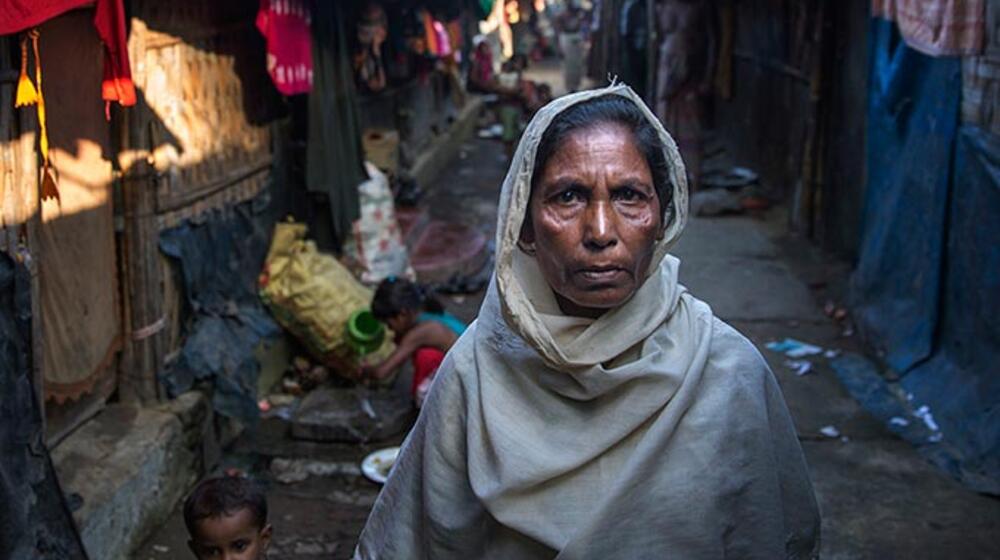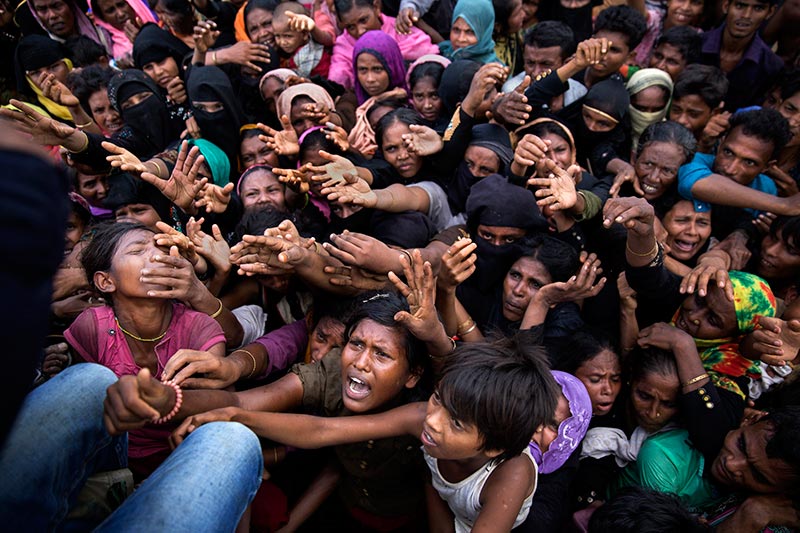
COX’S BAZAR, Bangladesh – The border between Bangladesh and Myanmar is the site of the world’s fastest growing refugee crisis. Over 620,000 Rohingya refugees from neighbouring Rakhine State in Myanmar have arrived in Cox’s Bazar District in just three months.
With more refugees arriving every day, settlements are overflowing. The concentration of refugees is now among the densest globally. And more than half the arrivals are women and girls.
Already marginalized and vulnerable, they are bearing the brunt of the crisis. Reports indicate sexual violence is pervasive, and many arrive in need of maternal care and other reproductive health services.

Yet amid the displacement, there is support, hope, healing and resilience. Women are emerging as front-line responders. From volunteers to caseworkers and midwives, women are taking care of women.
A nightmare that doesn’t stop
Humanitarian responders are racing to meet the needs of the refugees and host communities, and to plan for the complex, protracted situation ahead.
They confront overwhelming needs. People are arriving after marching for days through hills, across rivers and along the coastline. Many have experienced unimaginable grief.
“The outside wounds are healing, but the inside wound will always be raw,” one woman told UNFPA in the Balukhali settlement. Her husband and six other family members died when their home was torched. She was beaten and stabbed. “Every night I have nightmares. I can’t sleep.”
Even after they arrive in the camps, violence – especially gender-based violence – remains a significant concern.

Many women are alone, or are now the heads of their families. Extreme overcrowding and limited privacy are major safety risks for them and their children. Essential tasks, such as collecting water or firewood, bathing, or using a latrine, can put them at risk.
And pregnant women and new mothers are in critical need of maternal health services.
Merula gave birth nearly a month ago. Her baby was delivered inside a makeshift tent with the help of her mother. She now has three children to care for – in addition to her husband, Saddam, who is recovering from a gunshot wound.
Women helping women
Yet in spite of the tumult, women are emerging as leaders and outreach workers, connecting one another to aid and support.
Monowala was already living in Bangladesh when the crisis escalated this summer. An ethnic Rohingya, she volunteers in the refugee settlements, telling women and girls about UNFPA’s women-friendly spaces – safe places to receive information, medical care and referrals to counselling.

The spaces are helping women rebuild a sense of community. Some have started calling them “shanti ghar,” which means “safe haven.”
“The kind of support the women need, a doctor can’t provide it. The wound is inside,” Monowala said. “Women understand when they come here there is no financial support offered. They say what we offer is worth so much more.”
In the makeshift settlement of Leda, people seek out “Auntie Leila,” another Myanmar Rohingya transplant who has been in Bangladesh for years. She also directs people to the women-friendly spaces.
“Whenever I find a survivor of gender-based violence among new arrivals or around the streets, I make sure to bring them here,” she said. “The women, they like the space to come and speak openly. Sometimes they bring their children to play inside.”
Such women are essential. “Volunteers are trusted because they are living among the community. They know the language and culture,” said Mosrafa, a programme manager at one of the spaces. They also know how to find those in need. “The women face a lot of violence, so we can’t expect them to always come here to seek help. Sometimes we have to go to them.”

Women’s participation in public life is highly restricted. “Women are not permitted to sit in tea shops to share stories, gossip. That’s why it’s so important for women to have a space like this,” said Noor Begum, a UNFPA caseworker.
Midwives save lives
UNFPA-supported midwives are also delivering life-saving care, both at the safe spaces and at mobile reproductive health clinics. They provide a range of services, including antenatal care, safe delivery services and post-natal care, as well as clinical management of rape.
At the mobile clinic in Balukhali, a determined midwife named Sharifa built a bamboo birthing table with her own hands.
At the Kutupalong refugee camp, Sabekun is 25 weeks pregnant with her first child. She had arrived just the day before, after walking for seven days to flee the violence back home. She woke up sensing something was wrong – the baby wasn’t moving as usual.
At the camp’s health facility, a midwife assured her the baby is fine, but she needs rest to overcome her exhaustion.
“I felt so afraid and uncertain this morning, but now I feel more at peace,” Sabekun said. “I feel reassured.”
Lifting the burden – together
UNFPA caseworker Rafia pointed out that women are an entry point for reaching the whole community with messages about services, safety and human rights. “They will go back to their families and friends and disseminate that information. If we provide information to the women, they will spread it far,” Rafia said.
And women are also working to break down the deep-rooted stigma around surviving sexual violence.
One of the Rohingya volunteers fled to Bangladesh a decade ago during an earlier outbreak of violence. “My younger sister was taken to a local school and raped and tortured for five days,” she said. “There were no services like this available for my sister when we arrived here… Usually in society if you are raped, you become stigmatized and untouchable.”
Today, she and other community members are calling for change. “Our community shouldn’t judge this anymore. Our community shares this experience. It is a collective torture, but we are in this together and we can support each other… We must share with each other and lift the burden of all the trauma.”


